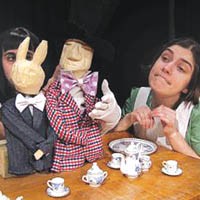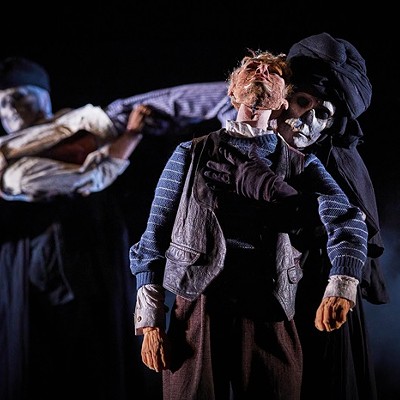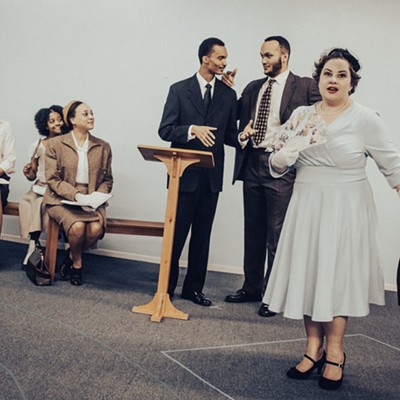Among muses, Alice Little is up there with the Mona Lisa. Little was 10 when a lecturer in mathematics named Charles Lutwidge Dodgson took her rowing and told her a fantastic story he apparently made up on the spot, about a child exploring a world of bizarre creatures and upended logic. The books he wrote her, published under the pen name Lewis Carroll, became enormously popular; 140 years later, Alice in Wonderland and its sequel, Alice Through the Looking Glass, have inspired dozens of stage and screen adaptations and countless homages and rip-offs.
Much less frequently explored is the relationship between Little and Carroll -- a relationship tainted, to modern regard, by the 20-year age difference between them. But understanding Little, Carroll and even the Alice books also requires understanding the culturally revolutionary era in which they lived.
It sounds like a book in itself. But thanks to Toronto's Stranger Theatre, we have and what Alice found there, an hour-long multimedia puppet show headlining the eighth annual Black Sheep Puppet Festival, at the Brew House.
Stranger's Alice depicts Carroll lecturing about the late 19th century and telling his "Alice" stories. Meanwhile, Alice herself keeps breaking in on his talk. Carroll is embodied by a rod puppet, elaborately jointed and spindly like a spider, while Alice is played by a rotating cast from Stranger's all-women troupe. Video and slide projections help tell the story.
England's Victorian era was a time of exploding scientific knowledge, industrial growth and colonial conquest. "It's a small world and a large world at the same time," says Stranger artistic director Kate Cayley, who wrote and directed Alice. One reference point is Carroll's work as a portrait photographer: Photography was increasingly used to popularize scientific knowledge. Imperial conquest fueled the art of mapmaking and the growth of rail transport. As industry grew, child labor became pervasive even as the wealthy cultivated what Cayley calls "an aggressively sentimental idea about childhood."
"It's very pertinent to now," says Cayley, 28.
Stranger Theatre, founded in 2001 by friends from King's College, in Halifax, likes challenging material. Its non-puppet work has included an adaptation of "The Yellow Wallpaper," the classic short story about madness. At last year's Black Sheep, Stranger performed The Counterfeit Marquise, a puppet piece about an aristocratic boy raised as a girl in 17th-century France.
For all the historical background in Alice, it's built around a human mystery. Carroll's Looking Glass, which he wrote seven years after Wonderland, is "pervaded by a very deep sense of loss of her," says Cayley: Alice Little drifting away as she became an adult. Yet, Cayley says, Little herself believed that Carroll rejected her.
In the books, Alice was less heroine than catalyst. "She was really a muse in the old sense," says Cayley. "You don't get a really strong sense of her personality from the way he writes about her. ... We were interested in the difficulty of being someone's muse."
Other Black Sheep shows drawn from real life include Denver-based Sleepy Sybil's evocation of how one Soviet woman saved her husband's poems during Stalin's purges. Meanwhile, myth, literature and popular culture also come together in "The Frankenstein of Everyday Life," by Shoddy Puppet Company.
The Philadelphia-based troupe's cardboard aesthetic is distinct from, say, Stranger Theatre's polished work. Moreover, performer Morgan F.P. Andrews won't be telling us about Frankenstein so much as asking.
Andrews co-curated the Black Sheep fest with Pittsburgh's Tom Sarver; he also collaborates with Philly's Ramshackle Enterprises on another piece, "Awaken the Mud." His roughly 20-minute "Frankenstein" -- based on Mary Shelley's classic novel and situationist philosopher Raoul Vaneigen's The Revolution of Everyday Life -- plops the monster into our workaday world.
Andrews notes that everyone creates his own Frankenstein. Shelley's original, for example, was agile, clever and ambitious -- hardly the lumbering fellow in the classic 1931 film. Andrews' own idea of the patchwork creature "living on borrowed brains" was first molded by Mel Brooks' parodic film Young Frankenstein.
"Frankenstein" plays with that ambiguous identity, as well as with elements of chance in the performance itself. "Some things spin out of control and we don't really know what's going to happen," says Andrews. "Just like we don't know what would happen if the Frankenstein monster walked into the actual theater.
"Who was Frankenstein?" asks Andrews. "We don't know. It's who Frankenstein is now that's really important."

Black Sheep Puppet Festival Gallery opening and reception 7-10 p.m. Thu., Oct. 19. Performances 7-11 p.m. Fri., Oct. 20, and Sat., Oct. 21 ($15). Family Matinee (free), 3-4 p.m. Sat., Oct. 21. The Brew House, 2100 Mary St., South Side. 412-381-7767 or www.blacksheeppuppet.com














